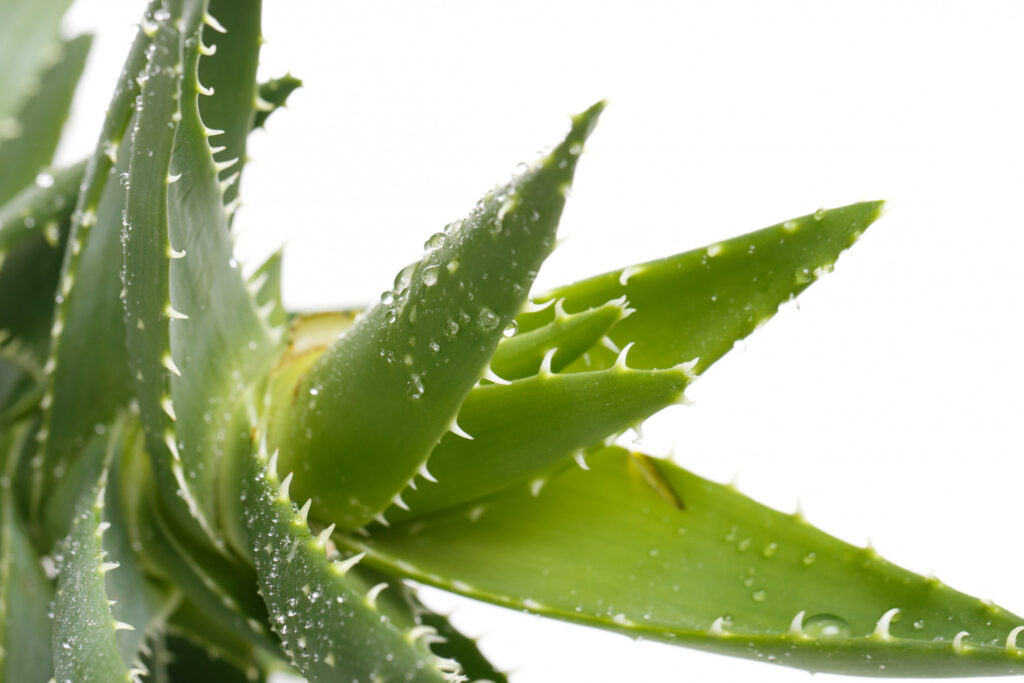
In this article
Benefits of Aloe Vera
Aloe vera, scientifically known as Aloe barbadensis, is a versatile plant renowned for its medicinal properties, particularly its antioxidant and antibacterial qualities. Beyond its common use in treating skin injuries, aloe vera offers a plethora of health benefits, from reducing dental plaque to managing blood sugar levels. This article delves into the multifaceted advantages of this remarkable plant.
1. Healthful Plant Compounds
Aloe vera is extensively utilized in the cosmetic, pharmaceutical, and food industries, boasting an estimated global market value of $13 billion. The plant is characterized by its thick, fleshy green leaves, which store water in the form of a gel. This gel is rich in bioactive compounds, including vitamins, minerals, amino acids, and antioxidants, making it a valuable ingredient in various products.
2. Antioxidant and Antibacterial Properties
The gel of aloe vera is a powerhouse of antioxidants, particularly polyphenols. These antioxidants play a crucial role in health by inhibiting the growth of certain bacteria that can cause infections. Aloe vera’s antibacterial, antiviral, and antiseptic properties make it an effective remedy for skin problems and wound healing.
3. Accelerated Wound Healing
Aloe vera is widely used as a topical treatment for sores and burns, including sunburns. Historical records from the United States Pharmacopeia, dating back to the early 19th century, highlight its use as a skin protectant. Modern studies support its efficacy in treating first and second-degree burns, reducing healing time, and preventing redness, itching, and infections.
4. Dental Plaque Reduction
Dental health issues like tooth decay and gum disease can be mitigated by reducing plaque buildup. Aloe vera has proven to be as effective as traditional mouthwash ingredients like chlorhexidine in reducing plaque, gingivitis, and salivary Streptococcus mutans, a plaque-producing bacterium. Its antifungal properties also make it effective against Candida albicans, a yeast found in the mouth.
5. Treatment of Canker Sores
Canker sores, or mouth ulcers, can be a painful nuisance. Aloe vera has been shown to accelerate the healing of these ulcers, providing relief faster than many other treatments. Studies have demonstrated its effectiveness in reducing pain and shortening the healing period of mouth ulcers.
6. Constipation Relief
Aloe vera latex, a sticky residue found just under the leaf skin, has well-known laxative properties due to a compound called aloin or barbaloin. While effective in treating constipation, it is important to use it cautiously due to potential safety concerns with frequent use. Since 2002, aloe latex has not been available as an over-the-counter medication in the U.S.
7. Skin Improvement and Wrinkle Prevention
Preliminary findings indicate that aloe vera gel may contribute to slowing the aging process of the skin. Research has demonstrated that consuming aloe vera gel orally can boost collagen production and enhance skin elasticity. Additionally, it helps the skin retain moisture and improves skin integrity, which is beneficial for dry skin conditions.
8. Blood Sugar Management
Aloe vera may aid in managing diabetes by enhancing insulin sensitivity and improving blood sugar levels. Although research indicates a moderate to high quality of evidence supporting its benefits for prediabetes and type 2 diabetes patients, more rigorous studies are needed before it can be widely recommended for this purpose.
9. Potential Hair Growth Benefits
Aloe vera’s benefits extend to hair care, particularly in treating seborrheic dermatitis, a condition that can cause temporary hair loss. Aloe vera has been shown to reduce itchiness, scaliness, and affected area size, highlighting its potential in promoting hair growth.
How to Use Aloe Vera
Aloe vera can be used in various forms, including topical gels, ointments, raw leaves, and consumable liquids. Each form serves different purposes, from skin application to digestive health.
Risks and Considerations
While aloe vera is generally safe with few side effects, oral consumption can cause stomach cramps or diarrhea due to its laxative effects. There have also been rare reports of liver injury associated with oral forms of aloe vera. Additionally, non-decolorized whole leaf extract of aloe vera may pose cancer risks, as indicated by studies on rats.
The Takeaway
Aloe vera is a multifaceted plant with numerous therapeutic properties, particularly for skin and oral health. Whether used topically or consumed, it offers a range of health benefits. However, it is crucial to use aloe products with caution, especially in oral forms, and to consult a healthcare professional before starting any new treatment.
By understanding and leveraging the benefits of aloe vera, individuals can improve their health and well-being in a natural and effective way
A Quick Review
Aloe vera, known for its antioxidant and antibacterial properties, offers multiple health benefits including reducing dental plaque, accelerating wound healing, and managing blood sugar levels. It also aids in skin improvement, prevents wrinkles, treats canker sores, and promotes hair growth
FAQS
What are the primary benefits of aloe vera?
Aloe vera helps reduce dental plaque, accelerates wound healing, prevents wrinkles, treats canker sores, and manages blood sugar levels.
Can aloe vera help with skin aging?
preliminary evidence suggests that aloe vera gel can slow skin aging by increasing collagen production and improving skin elasticity.
Is aloe vera effective in treating burns?
Aloe vera is an effective topical treatment for first and second-degree burns, reducing healing time and preventing infections.
Can aloe vera improve hair growth?
vera can help reduce itchiness and scaliness associated with seborrheic dermatitis, which may promote hair growth












